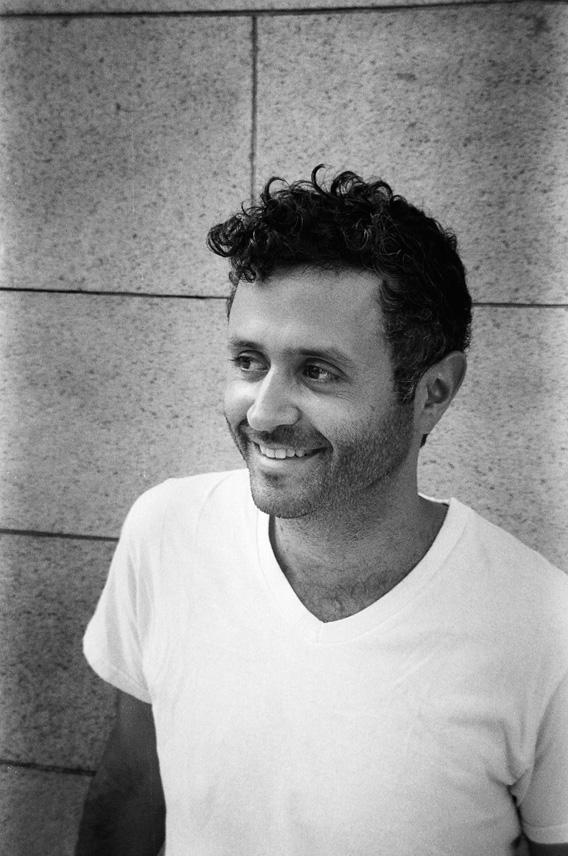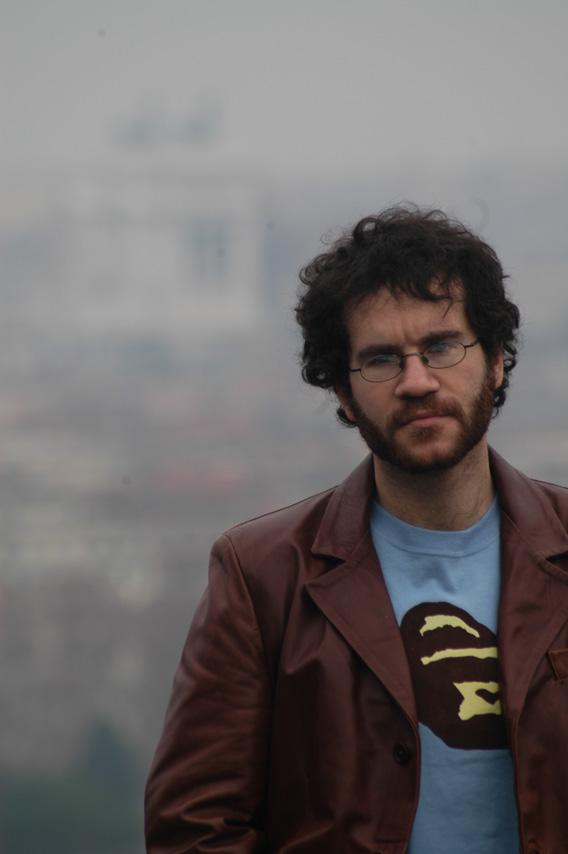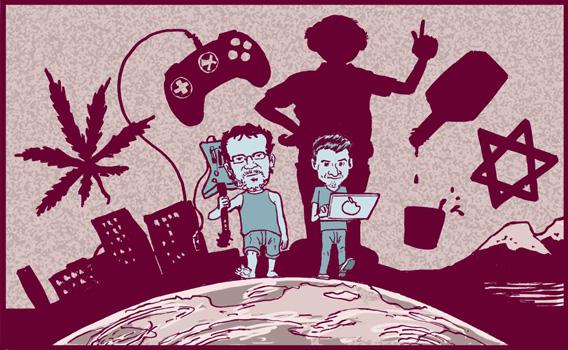A few years ago, Tom Bissell and Gideon Lewis-Kraus were troubled and aimless in Estonia and then they went on a very long walk. Tom—with notable passivity—said that his life was “spinning out of control.” Gideon went along for a bit of that ride, entering into a period of advanced and chaotic inebriation. Now they both have books out. They are essentially about the same thing: What do we do with our hours? How shall we make things? Why are humans so wonderfully ridiculous?
by Gideon Lewis-Kraus
Riverhead Books
Tom’s, Magic Hours, is a collection of essays from the last decade, really very loosely about creation, particularly the making of movies and books, and the troubles of doing so, which is a nice capstone to his period of having problems making things. Gideon’s, A Sense of Direction, is an account of three pilgrimages, the first of which, El Camino del Santiago, was the long walk he undertook with Tom.
Gideon had been living in Berlin, as you do. He glosses over the foundational activities of their then-new friendship. Tom, by his own far more direct account, had, by 2008, a “sacramental devotion to marijuana,” and while in Estonia had embraced a likely less ritualized love for cocaine. Gideon seems like the type to indulge in what everyone else is indulging in, part of his own specific problem with … it’s less clear? He had a fear that he would accidentally live a staid or incorrect life and come to regret it, so he was following will-o’-the-wisps around Berlin to raves and to openings to make sure that he didn’t. He was burdened with the story of his father, a rabbi, who, late in Gideon’s teens, left his mother for a man and immediately bought a lot of very gay clothes. Gideon’s questions, quite reasonably, include: Is my very existence the result of a deeply regretted life?
So Tom and Gideon walk this very long walk across Spain. A good and appealing idea! Gideon vows to take a break from drinking during the walk and … almost does so. (That’s what they call a “red flag” in the rehab biz.) Tom’s feet become mutilated with blisters. This is all exceedingly recent history. Gideon was born Jan. 12, 1980, which means he is 32 today. He had moved to Berlin at 27; he turns 30 in the book. (Tom was born in 1974— an interesting tiny margin of generational divide.) They annoy each other; they take copious notes about every rock and fellow pilgrim; they take notes about each other taking notes.
Within a year, Gideon made a lone pilgrimage in Japan. And then not long thereafter, he and his father and his brother set off for Ukraine, for the really horrible-sounding Rosh Hashanah pilgrimage of Hasidim to the grave of Rebbe Nachman. Throughout the course of the book, the pilgrimages move from aimless process to book-writing process, a neat and also necessary meta-trick. That the final pilgrimage is Jew-oriented and overtly intended to resolve his issues with his father is appropriately stagey.
There is something quite disturbing in the way in which Gideon writes about his father, who is a bundle of secrets and half-muttered truths and glancing drive-bys of information. This is Gideon’s chief complaint about his father’s behavior— but also the way that he chooses to inform us about the man. Because of this delivery method, the picture of his father is looming and monstrous but vague. He sketches a menacing Big Dad figure: He threw things, was capricious and prone to rage, was eccentric and frightening, was charming and hilarious but moreover unknowable in the way of fathers. What’s striking is that Gideon was unable to lay this out more directly: He cannot bring himself to sit down and write direct pages to relay what kind of menace his father was, and how that changed over time. In part this was likely to protect his father and/but also this is a 6-year-old’s depiction of a parent. (Five cents please!)

Photograph by Rose Lichter Marck.
This is not entirely Gideon’s fault. In a recent interview, his father made this declaration about reading the book:
“There are a couple things in there, which in a perfect world, I would possibly ask him to change—I don’t think they’re entirely accurate. On the other hand, that’s not my place. Look, I think the book is amazing. I cried through most of it. It’s nice to see Gideon in a different light. And there’s nothing in there that’s not accurate.”
Emphasis mine, though the reporter also jumped on it. For the record, if one of my parents said that to a reporter, I would immediately book three special bonus-length sessions with a therapist just to bang my head against those words until I could laugh again.
How do you please a father? Beats me! Most of us assemble minor father figures and please them instead. That’s why, when you read both these books at the same time, you feel a little sad that Gideon isn’t in Tom’s book too. (Not even in the acknowledgments!) But Tom wrote a very nice and funny review in GQ of Gideon’s book. It is headlined “I Am the Star of Your Memoir.” So, mission accomplished.
* * *

Photograph by Hendrik Dey.
“Travel writers are seldom scholars,” Tom wrote in 2006, in a fiery and vicious essay, collected in his book, on Robert D. Kaplan. “They are, by inclination if not definition, transients and dilettantes. All that can save the travel writer and redeem his or her often inexpert perceptions of foreign people and places is curiosity, a willingness to be uncertain, an essential emotional generosity, and an ability to write.” Gideon has in mind these four qualities for himself, while in turn he despises the travel writers whose shoddy yet sometimes affecting guidebooks he clutches in the rain and cold.
Like all books, Gideon’s comes with endorsements. One harrowing and unfortunate declaration (by blurb machine Gary Shteyngart) describes the book as Eat, Pray, Love as written by David Foster Wallace. As upsetting as that is, it’s accurate. And to reclaim the much-abused travel and self-discovery memoir would be a good thing. Gideon has an unusual, maybe-bizarre, maybe-genius travel-writing method. He writes largely in mass emails, a process he documents himself performing throughout the book. He has, this year, been reporting in Japan, and was sending his dispatches to some dozen people, including his brother and Tom. A recent email from that trip with the subject line “Day 2/3” was 3,200 words: long for the medium, short for, say, the New York Review of Books. His raw email copy is basically magazine-ready.
In Japan the previous time, for the second pilgrimage of the book, he was accompanied for a brief while by his grandfather, and they had this conversation about his father:
“I’m sure he still won’t read the emails I send out along the way.” My father seems to have made a habit of not reading what I’ve written. He’ll buy a copy of a magazine I’ve got something in, he’ll put it out on the coffee table and show all his friends, and he still won’t read it. It boggles my mind.
”Well, Gideon, you do write a lot sometimes. Those emails you send are pretty long … Lois and I really liked all the dispatches you sent out from Spain, but you didn’t do the walk just to send out emails, did you?” …
”Yes, I definitely did it just to send emails. Most of what I do is designed to generate material for indefensibly long emails.”
“Really?”
“No. Well, yeah, but no.”
The oppositional stutter there, ironic in intention or at least open about its conflict, signals a discomfort with this odd process that he has invented or more accurately reinvented. “We are all of us deeply alarmed,” Bissell wrote in 2010, in an appreciative essay on Tommy Wiseau, the director of the terrible film The Room, by “the parts of us that are selfish and controlling, that crave attention at any cost, that imagine ourselves as superlatively gifted, that arrange all sources of light—whether literal or metaphysical—to be flattering.” There is something so unimpeachably joyful and childlike about this process of email-blasting one’s friends and family, but also something hurt and needy. Or, requesting to be hurt: He reacts with overt hostility to responses he deems inappropriate; notable, in that he is the one broadcasting something between a monologue and an assault. At one point, midway in his travels, he simply deletes unread all responses to his emails that begin with a cheery “It sounds like you’re having a wonderful trip!”
In October of 2010, Gideon emailed me, one-on-one. “We’ve never met and you’ve got no idea who I am but I’m nonetheless about to ask you to read a hundred pages,” he wrote. “I’m looking for someone young and gay and terrifically smart and unsentimental and who doesn’t know me at all to let me know what he makes of this.” What is notable here? First, the flattery! Second, probably, the flattery. (I am almost a decade older than him, for one thing. All the rest I’ll accept.) Those pages were the draft final third of this book, the trip among Hasids with his father, and the pages did not change too substantially before publication; for what it’s worth, I honestly could and did give him the gay seal of approval that he was clearly looking for, and also some other generally useless thoughts. And in the acknowledgments of this book, he thanks well more than 100 people for reading drafts, including Michael Chabon, Dave Eggers, Chelsea Clinton, Gary Shteyngart, Keith Gessen, as well as a number of his friends and/or exceptional lesser-known writers, and me.
This behavior, this habit of broadcast, improbably, seems in the end actually un-mercenary. What if every book was peer-reviewed far and wide in this manner? Workshopped by email, to all corners of the globe! Would it make for a better contemporary literature?
* * *
“In an effort to offer something, anything, that is not already on Facebook, our writers seem less likely to go big than to go small, writing in great polished detail of the most trivial thoughts and deeds,” wrote B.R. Myers in the May Atlantic, in the process of trashing The Art of Fielding. Both Tom and Gideon are prone to go micro, even trivial, in the style of the day. This seems correct, though, for nonfiction. Pilgrimage in particular, after all, is the act of throwing the vain self on an obstacle. That obstacle is seemingly the mountain ahead, sure, but it’s really the rock in the shoe. Does Gideon, through the process of instep agony, actually know himself at the end? “I have a way of, say, asking a stranger for directions and seeming as though I’m calling him an idiot,” he writes at one point. There is definitely something true about this, as we see from his quick-to-argument transactions with fellow pilgrims, but, as we also know, Lewis-Kraus is a master flatterer as well. (With mutual friends, he has displayed an ability to say the uncanny, acupressuring soft and sore spots, making people feel their darkest secret vanities are most valid.)
by Tom Bissell
Believer Books
In an essay in Magic Hours, Tom writes about the history of fame and literature, about the way that books are always prone to disappear: about Whitman, the self-promoting whore, and about Melville, whose most-famous work nearly sank forever. Fame, attention, respect: All this comes from making people want. This kind of attention isn’t about creating a liking but inspiring people to be like the creator.
Tom starts off as an aspirational friend for Gideon. When they meet, Tom has a career Gideon admires— desires, really. This is funny, because, as collected (and often poorly retitled) in Magic Hours, the life of Tom Bissell Magazine Writer doesn’t seem that appealing actually. But Gideon wants to become like him. This is even though Tom has become a drugged-out, video-game-addicted waste case, with little current interest in writing. Then they both change.
Gideon’s book, far more so, makes the reader want things as well—to drop out like him, to jump off on a pilgrimage, even as we’re informed that the benefits of pilgrimage are nebulous, complicated, maybe even nonexistent. Every journey may just be a filling of the hours; still, I certainly wanted to be like him for a while. I wanted to be like him in that way that each time you play Guitar Hero you become possessed with the desire to learn how to play a real guitar. The problem with that desire is that you have it each time afresh, because you never act on it.
The feeling with Tom, though, is that one wants to aspire to be a smarter, more careful culture consumer: to notice how fragile great things are, to see how easy grand projects become terrible, to revel in an honest admission of one’s personal tastes. I wanted to be like him in that way— or maybe I just wanted his approval too. In either case, that attitude’s a lot easier and faster to put on than whatever you might get from a long walk through nowhere.
